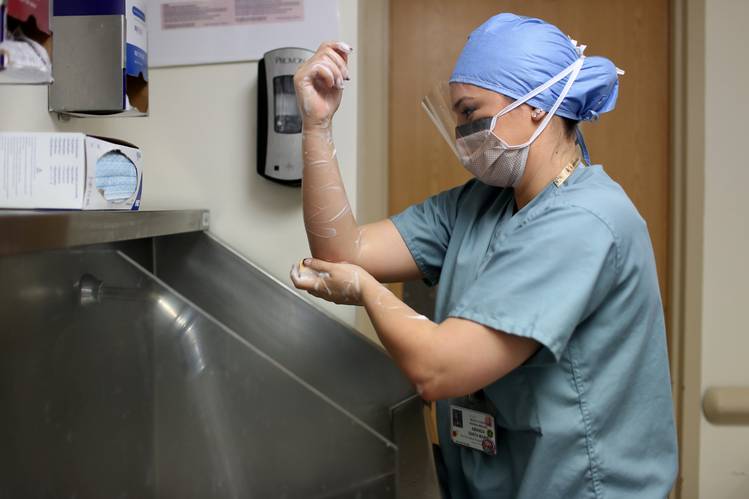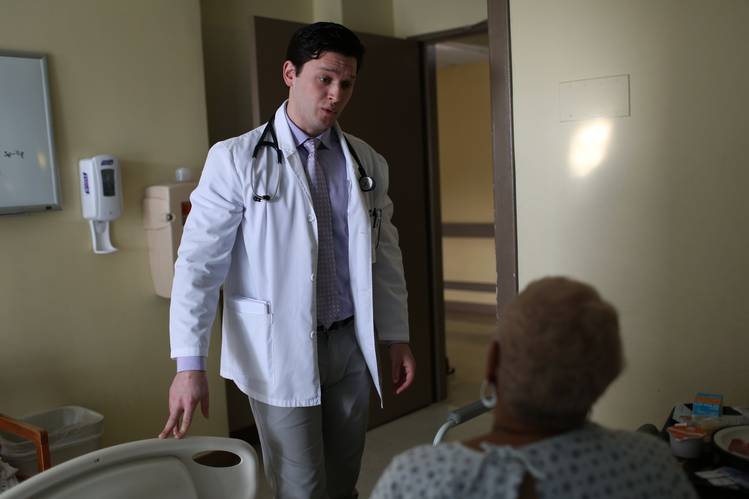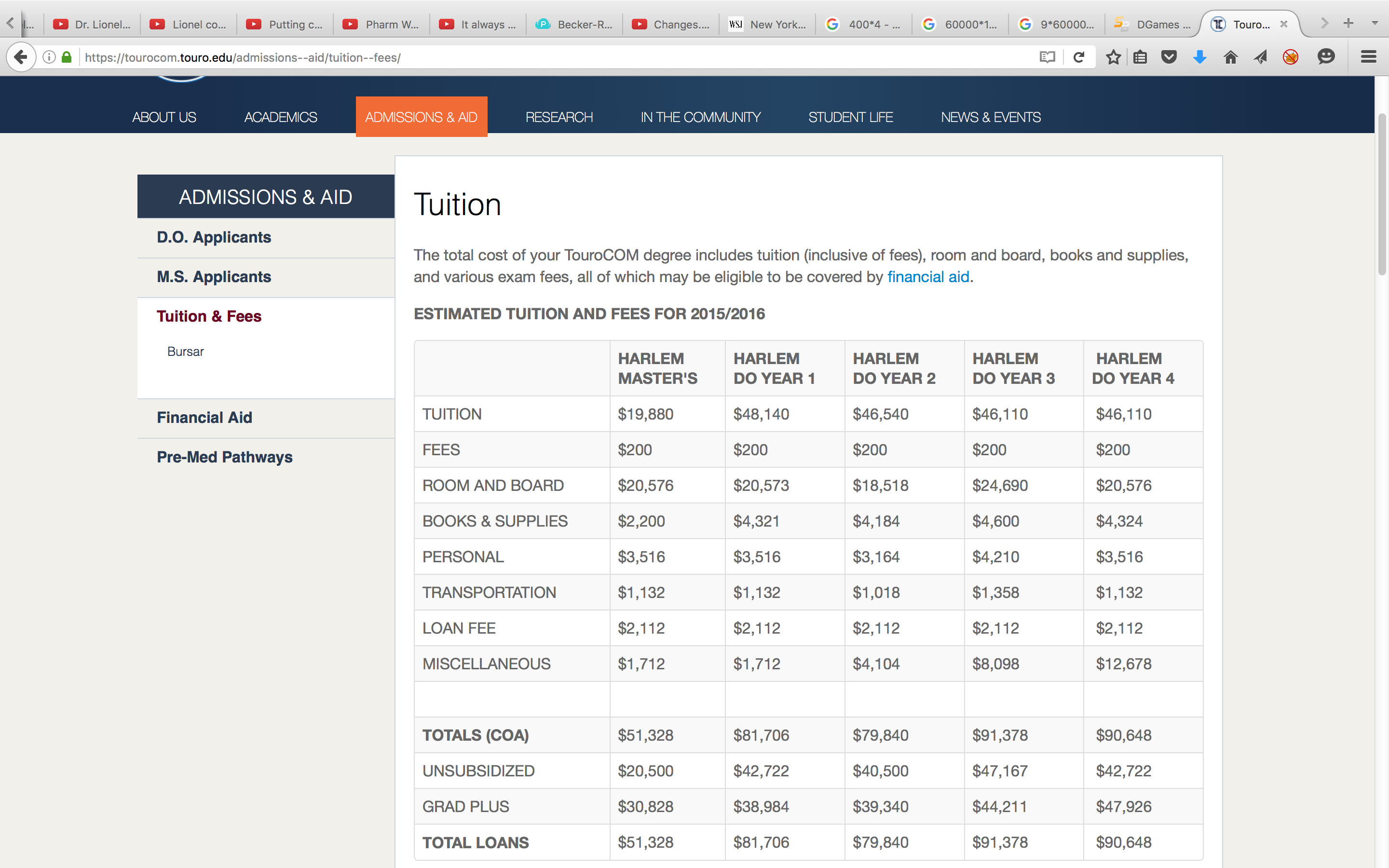I don't subscribe to the WSJ. Would you mind copying the full story here?
New York’s Medical Schools Say They Feel Squeeze in Finding Clinical Clerkships
For-profit offshore competitors buy slots from hospitals
ENLARGE
Greg Zielinski, center, has a clinical clerkship at the Brooklyn Hospital Center. He attends St. George’s University School of Medicine in Grenada, which pays hospitals for the slots. New York medical schools object to the policy. PHOTO: BESS ADLER FOR THE WALL STREET JOURNAL
By
LESLIE BRODY
April 26, 2016 5:18 p.m. ET
2 COMMENTS
New York medical schools and their competitors offshore are clashing over a precious resource: the opportunity for students to watch and learn from doctors in hospitals.
Students in their third and fourth year of medical school need clinical clerkships so they can see how doctors diagnose patients, perform surgeries and deliver babies.
Officials at New York medical schools say it is becoming harder to find sites for these rotations, partly because for-profit offshore medical schools, often in the Caribbean, have bought slots from New York hospitals at prices topping $400 a week per student.
American medical schools typically don’t pay for spots this way, instead offering hospitals that help train students the prestige and benefits of university affiliations. Leaders of New York’s medical schools balk at paying for each clerkship.
“It’s immoral,” said Edward Halperin, chancellor of New York Medical College in Valhalla, in Westchester County. “I don’t think human illness is a commodity to be sold in the marketplace.”
ENLARGE
Amanda Santa Maria, another medical student at St. George's University School of Medicine, practices scrubbing at the Brooklyn Hospital Center. PHOTO: BESS ADLER FOR THE WALL STREET JOURNAL
Officials at offshore schools say it makes sense to compensate hospitals that help them. G. Richard Olds, president of
St. George’s University School of Medicine in Grenada, said “it does cost them money, time and energy.”
St. George’s has paid nearly $38 million for clerkships since 2007 to NYC Health + Hospitals, according to a spokeswoman at the city agency. She said the deal didn’t displace students from U.S. medical schools but was a complement. The spokeswoman for the financially troubled system said the deal helped it address a
shortage of primary-care doctors; under the partnership, the university gives scholarships for students who commit to work in public hospitals.
Concern over the purchase of spots has grown more intense as schools in New York and abroad expand to meet a projected shortage of physicians in the U.S.
During the tenure of former Chancellor Merryl Tisch, the state Board of Regents set up a committee that decides whether to approve international medical schools that want to place students in clerkships longer than 12 weeks. State education department officials said these offshore schools haven’t been permitted to add slots in the past two years while this committee, led by two Regents, reviews their quality under a tougher set of guidelines.
A department official said that process will be finished in about a year, and the agency also wants to examine the teaching hospitals’ capacity to absorb more students. Leaders of international schools want the moratorium lifted, while critics want them barred from New York clerkships altogether, or at least curbed from expanding.
“If offshore schools go on buying more clerkships…we won’t have enough slots for our own New York students,” said Lee Goldman, chief executive of Columbia University Medical Center.
WE WANT TO HEAR FROM YOU
Have something to say about an article in Greater New York? Email us, along with your contact information, at
[email protected]. Letters will be edited for brevity and clarity. Please include your city and state.
A spokesman for the Greater New York Hospital Association declined to comment because its members are split on the issue.
Medical schools on the small Caribbean islands have limited sites there for clinical training. Many of their students didn’t get into U.S. schools and hope to work in the U.S., where many grew up.
Almost half of the clerkships lasting more than 12 weeks in New York are filled by students from schools offshore, according to Associated Medical Schools of New York, a coalition of the state’s 16 medical schools.
Jo Wiederhorn, president of the group, said letting for-profit overseas schools buy clerkships hurts her members’ ability to train better-qualified students.
ENLARGE
Mr. Zielinski checks on a patient at the Brooklyn Hospital Center. PHOTO: BESS ADLER FOR THE WALL STREET JOURNAL
Demand for these slots has grown as enrollment among New York schools rose 22% in a decade, to about 10,500 medical students last year. Meanwhile, some clerkship spots have been lost due to hospital closures and mergers.
Officials at offshore schools say their students perform an important public service: After getting licensed, they are more likely to work in underserved neighborhoods and short-handed fields like primary care.
They say their graduates also tend to be more diverse: At American University of Antigua College of Medicine, officials say about 20% are African-American.
Neal Simon, president of that institution, said his school’s students had lower grade point averages and Medical College Admission Test scores on average than those at U.S. schools, but such statistics don’t predict who will be a better doctor, and his students are qualified.
American medical schools must meet standards set by a group called the Liaison Committee on Medical Education. Leaders of offshore schools say they have to meet comparable expectations.
‘If offshore schools go on buying more clerkships…we won’t have enough slots for our own New York students.’
—Lee Goldman, CEO of Columbia University Medical Center
Ms. Wiederhorn, at Associated Medical Schools of New York, said that isn’t enough. If these offshore schools want to train American students to work in American hospitals, she said, “they should definitely have to meet the exact same requirements that U.S. medical schools have to meet.”
Dr. Olds, at St. George’s University, said his school is approved in all the states where it sends students for clerkships and in March, 831 of its students obtained first-year residency posts at U.S. institutions on their first attempt through the national matching program. He estimated about 90% of its U.S. citizens did so in past years.
American medical school officials “like to suggest we are second-rate medical schools,” Dr. Olds said. “They like to suggest we are taking spaces that they need. I would say neither of those things are true.”




